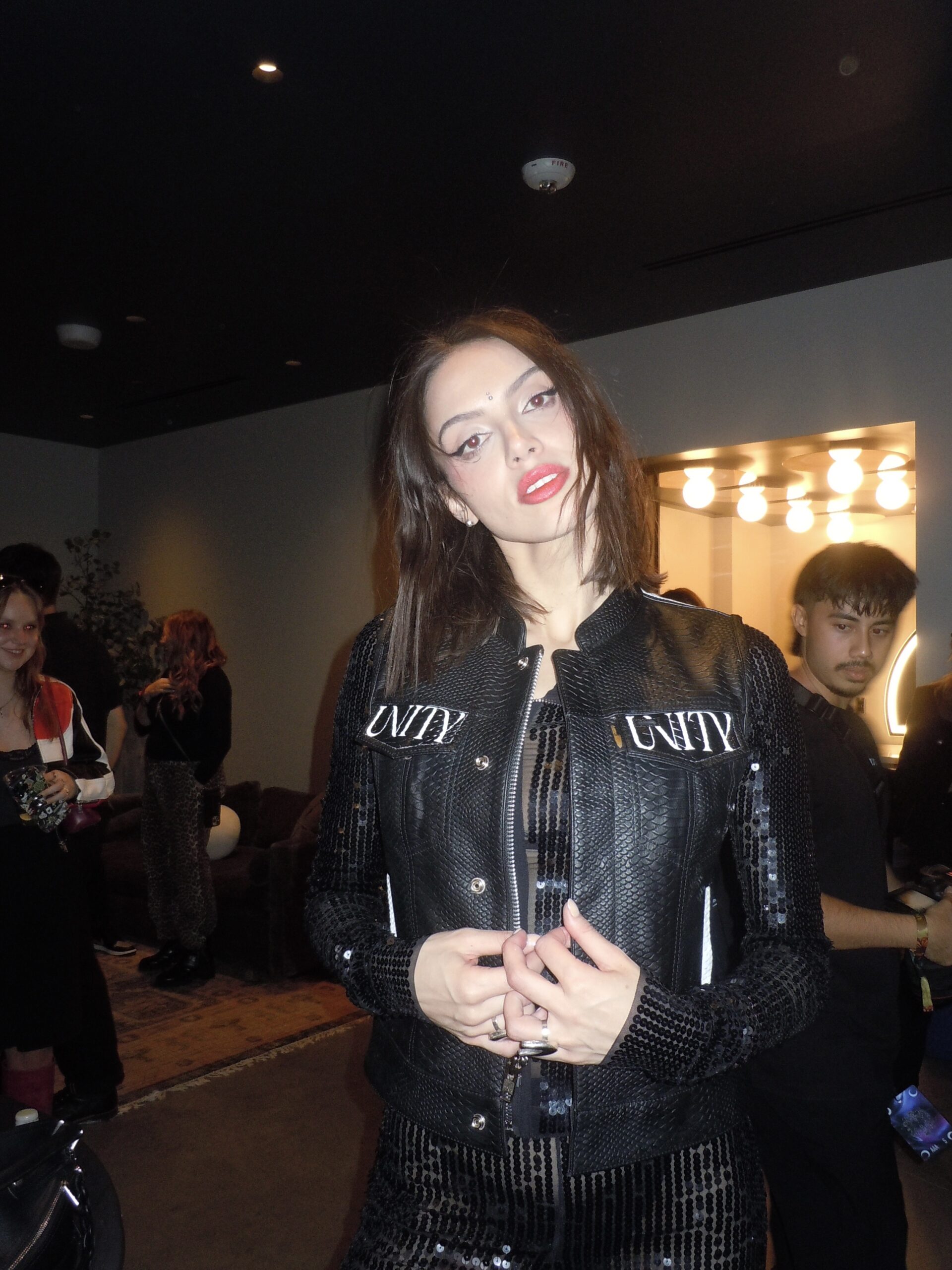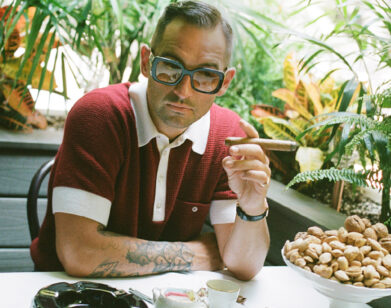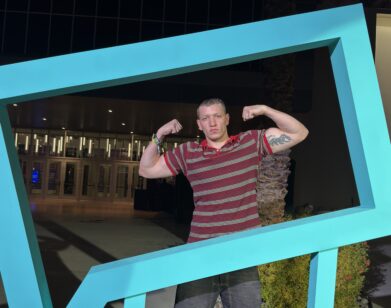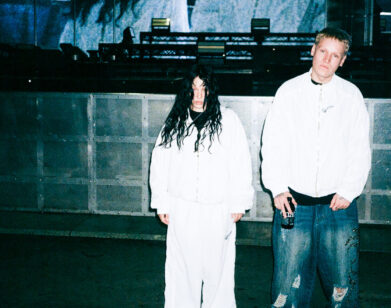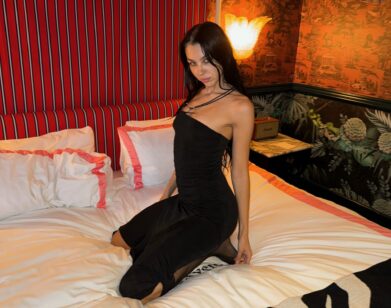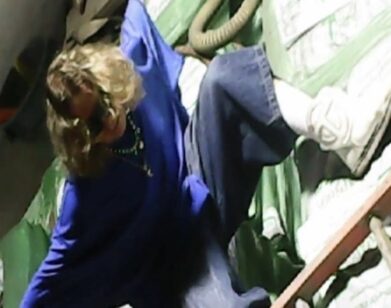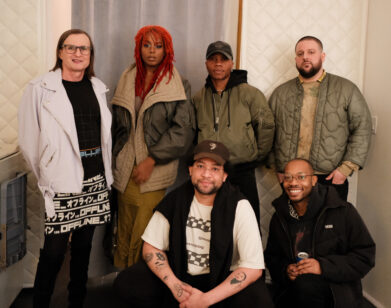SPHERE
Meet DJ Sara Landry, the High Priestess of Hard Techno
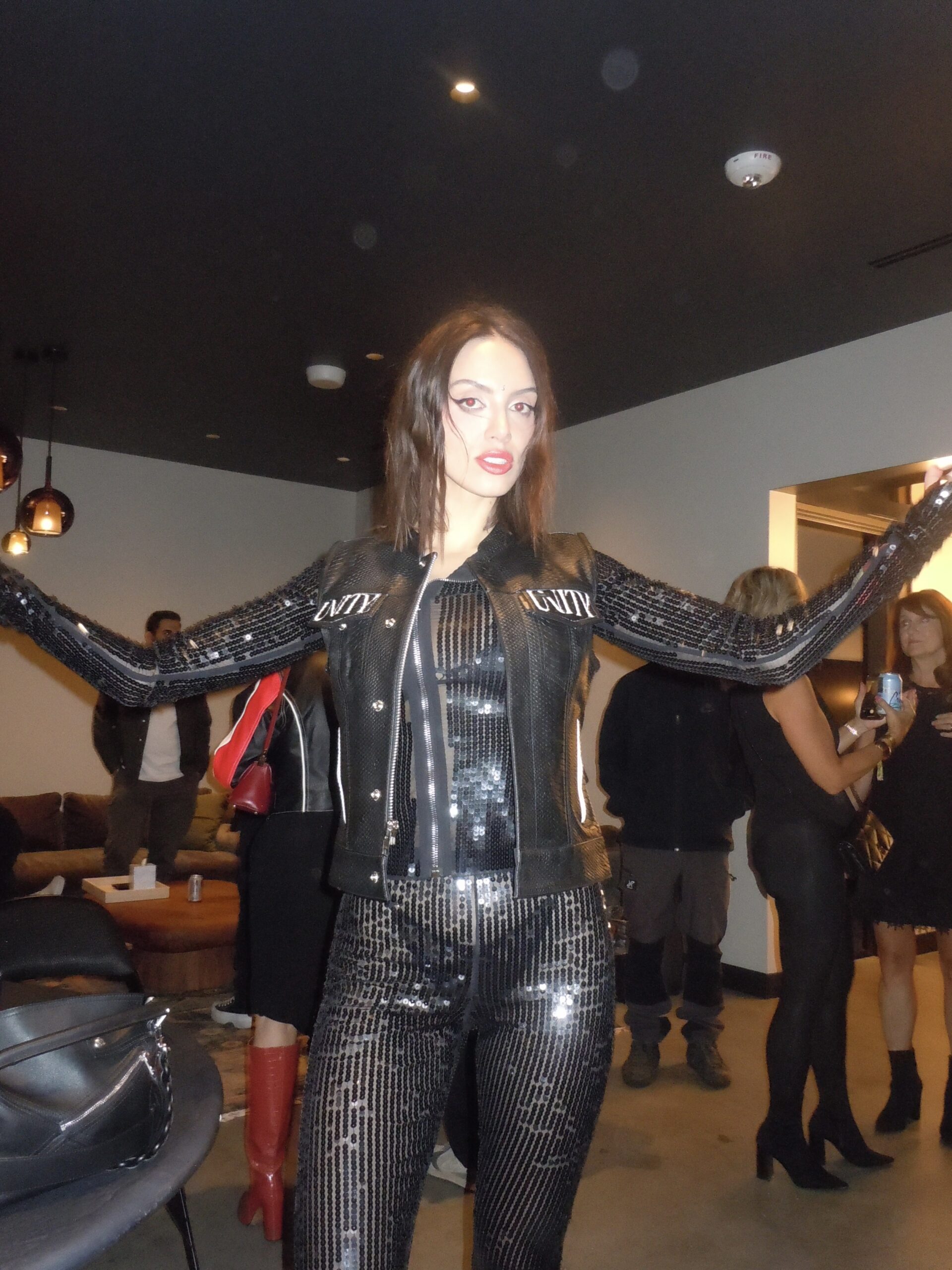
Sara Landry, photographed by Ary Russell.
FRIDAY 11:06 PM OCTOBER 17, 2025 LAS VEGAS
As Sara Landry played her final song to a crowd of 20,000 at Insomniac and Tomorrowland’s UNITY at The Sphere this past weekend, she took a deep breath and, after a long blink, started to cry. In a sea of neon-green strobe lights and industrial-strength bass, she knew she’d made it. Once a successful data analyst in Texas, the now Netherlands-based DJ couldn’t deny for very long that her heart was really in music after she began throwing parties throughout Austin. And so began her meteoric rise, culminating on Friday night (or more like Saturday morning) with a euphoric set at the most impressive of Vegas venues, where the “high priestess of hard techno” became the first-ever female DJ to headline. A few hours before her history-making debut, Landry invited me to her hotel room to talk about her rave-proof makeup routine and breaking into the techno boys club.
———
ARY RUSSELL: So we’re here in Vegas. How does it feel?
SARA LANDRY: Honestly, it’s really surreal. I have ADHD. I have no sense of object permanence at all. So I had seen this date in my calendar and my team had told me that I would be the first female DJ to headline The Sphere with Tomorrowland and Insomniac Unity, which is amazing. But it wasn’t until we actually got here and I was sitting in this room and looking at The Sphere out this window that I was like, “Oh my god, I’m playing in that venue tomorrow.”
RUSSELL: You’re like, “Wait, this is real.”
LANDRY: I’m so anxious I couldn’t sleep a wink, but I’m so excited.
RUSSELL: I was walking through Vegas for the first time today and everything is bright, shiny lights. It’s like, “Oh my god, look here, look there.” So I feel like it’s the perfect kind of place for that. But how does it feel to be the first woman to headline The Sphere?
LANDRY: It feels so insane. I can’t even believe it’s true. I’m super excited to have that opportunity and to get to play all my music and play my [Lady] Gaga remix. She was such a glass ceiling breaker, so now I’m like, “Bring the torch forward.” And some of my friends have new music out, so I’ll play their music in there, and it’s a bunch of music from everybody who’s signed on my label on one of the best stages in the world. I’m so excited.
RUSSELL: When you first started DJ’ing, did you ever imagine that you would be a pioneer like this?
LANDRY: I don’t think I ever thought that far ahead. My biggest goal with my music was always like, “Okay, I’d like to have a nice comfortable life for myself off of music.” And if I had gotten that, I would’ve been really, really happy. Then as things grew, they’ve grown so much further than I could have ever imagined. I think with a combination of hard work and a great team and a little bit of luck, I ended up in the position I’m in now, which is to be kind of at the front of a wave. I think about it often, and I try to make sure that I’m not somebody who kicks the ladder out behind me.
RUSSELL: I’m just now, in the year of 2025, getting into the techno scene. My friends are like, “Come to Nowadays, come to Basement.” But from what I’ve seen, I feel like in the past it’s been a little bit of a boys’ club. How has it been for you navigating in that space?
LANDRY: Yeah, it’s kind of like an era of when you go somewhere and you feel like you don’t belong over an attribute of yours you can’t control, you know what I mean? You know that feeling, I know that feeling. All the women in this room know that feeling. I’m like, “All right, well, fuck you then. We can do it the hard way.” I will say, though, the boys’ club exists, but we have an amazing girls club of really incredible, really talented, hard-working women, and I’m super grateful to be a part of that.
RUSSELL: Do you remember the first venue that you played?
LANDRY: Yeah, I did a small set in a bar in New York that was called Beautique. This was years ago. But the first thing I think I was actually booked for was at a dilapidated, literally decommissioned house on the east side of Austin for SXSW in 2016. Literally, it was condemned, and somebody went and set up DJ decks and was throwing SXSW parties in this house.
RUSSELL:Do you think it’s more nerve-wracking to be playing for a smaller group of people or in a place like The Sphere that’s got thousands?
LANDRY: Honestly, I feel like every show has its own zing of excitement. Every show, I get the same feeling of joy. Obviously at really large venues, you have something like that on a larger scale because it’s amplified by the number of people who are present. But I also really like smaller venues because you can really look at people. You can see them right there responding to what you’re doing. I’m just excited to check this room out because I hear it’s a really good one. Like most things, music is a frequency, and that’s what speakers do is: they allow us to align to the musical frequency that exists. And I think it’s a really, really powerful thing when everybody is aligned and tuned into the same frequency at once. It’s like when you have two sine waves of the same frequency and you put them on top of each other, they double each other and get twice as loud.
RUSSELL: When the venue is small enough for you to be able to see people in the crowd, what kind of person are you paying attention to? Who’s someone that you’re like, “I see you.”
LANDRY: I always look for distinct faces, and usually it’s just whoever’s right in front of me or if somebody catches my eye with a sign or something like that. When I’m up there, it’s tunnel vision. I’m focused on the decks, you know what I mean? And I’ll look up to check on everybody every so often. And it’s funny, just to mess with people, I’ll blow them a kiss or something like that. I used to be a rail rider myself. Now I’m on the other side.
RUSSELL: In your sets, you’re going hard and you’re sweating, but your makeup stays in place. I envy that because I’ll be out until 5 AM and I’ll take a selfie and I’m like, “Who is that?”
LANDRY: You’re just having a good time, girl.
RUSSELL: [Laughs] What’s your glam trick to keeping things relatively intact during a really hard set?
LANDRY: For a lot of these big shows now, I just have somebody come do professional glam on me, which is not an exciting answer at all. But I still slap glam on myself in a hand-mirror laying down in bed. I do the standard technique: makeup, sponge, foundation, setting powder with talc setting spray.
RUSSELL: Talc, okay.
LANDRY: Cream blush on wet, then dry blush on dry and then the stuff and then spray.
RUSSELL: Do you have any go-to products?
LANDRY: I use a lot of Charlotte Tilbury.
RUSSELL: She’s really good with coverage in general.
LANDRY: I actually wasn’t wearing foundation for a long time and then I started wearing foundation again and I bought the Haus Labs foundation. I really liked that. Shout out to her. She killed it with that.

RUSSELL: You went to NYU, right?
LANDRY: I did.
RUSSELL: We’re fellow alum.
LANDRY: What school were you?
RUSSELL: The laughing stock school, Gallatin.
LANDRY: Me too, girl. Honestly, it’s fine.
RUSSELL: You got to where you are.
LANDRY: Yeah, we girl-bossed to the moon with that. We made it work. That was my entry into girl-bossing. Basically, I just learned how to work a room in New York.
RUSSELL: And what did you study?
LANDRY: I studied what I called “the psychology of capitalism.” I studied social theory and social financial and economic theory and then psychology, advertising, stuff like that.
RUSSELL: Techno has always been big, but it’s becoming mainstream. With capitalist consumer culture in mind, how do you maintain the integrity and the authenticity of the techno space as it becomes more popular?
LANDRY: The key for me is I always make decisions creatively, artistically, and with every set from a place of “I genuinely love this track and I want to enjoy it here and play it.” I do play things that are a little bit more on the commercial side now, not necessarily intentionally, just because that’s the music I want to hear that makes me happy. The way I try to balance it is by really trying to lift up serious underground up-and-coming promoters and say their names in as many important rooms as I can, sign as much of their music as I can, play as much of their music as I can and really get eyes on them. If people online don’t like me or what I do or something, I’m like, “Okay, well, here’s 20 female artists in the underground space.”
RUSSELL: Let’s talk about your music a little bit. Obviously the goal is to feel this sense of euphoria, to feel up all the time. Do you think it’s possible to make a sad techno banger?
LANDRY: I have a lot of sad girl bangers because I write a lot of stuff in minor. I feel like my job is to make people feel things in a safe space. So tears of joy, tears of sadness, whatever comes to the surface, just let it out—obviously without overly disturbing the people around you. Let that wash through you in a wave and then it’ll pass and the next track will come. And I never finish on the sad shit.
RUSSELL: You finish up.
LANDRY: We end in the divine feminine, esoteric, uplifting stuff. That’s the note that I leave people with.
RUSSELL: You mentioned safe spaces. Do you have any rules when it comes to rave or club etiquette?
LANDRY: I absolutely do. Don’t judge or shame anybody for showing up authentically as themselves. And if you have an inkling or an inclination to do that in a space like this, turn the mirror around on yourself and ask what it is about you that’s making you want to come after somebody who’s showing up as their authentic and truest self.
RUSSELL: And do you have any DJ pet peeves?
LANDRY: Okay. Actually, yes. This is so silly, but sometimes when you have to hop on in the same decks as somebody and they do some crazy effects stuff on the way out and change all the settings to a bunch of weird stuff. Then you have 20 seconds to plug in and change it.
RUSSELL: And it’s dark as hell.
LANDRY: There’s no light. And you’re like, “Where am I?” And then you have a crazy delay or something. I’m always somebody where I reset the stuff to zero, so if there’s an effect knob up, I turn it down when I’m done. And crowd stuff, I guess I would just say don’t start a fight in the crowd. Y’all paid for these tickets.
RUSSELL: Also, it’s too sweaty for that.
LANDRY: Nobody wants to get into a sweaty fight. But it’s a part of the experience. I’ve had so many nights like that. And if you’re based in New York, like, Basement’s really Basement.
RUSSELL: I have to be in the mood for Basement.
LANDRY: See, I love an underground. No phones. That’s my roots. I will always love it ’til the day I die. I love fancy bells and whistles and air-conditioned venues as much as the next gal with pyro. But I do love a sticker on the back of the phone sweat box.
RUSSELL: I experienced that at Berghain last year and—
LANDRY: Berghain rocks.
RUSSELL: Do you have any crazy moments where you thought, “Thank god no one was allowed to record in this club”?
LANDRY: Oh, a thousand percent. But I’m not about to tell you. [Laughs]
RUSSELL: Fair. And my last question is, where’s the afters?
LANDRY: I have a flight at 6:00 AM so the afters is on Southwest. The afters is wherever the breakfast sandwich at the airport is.

